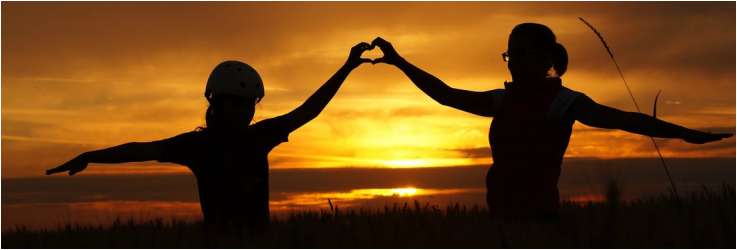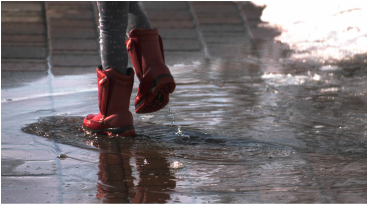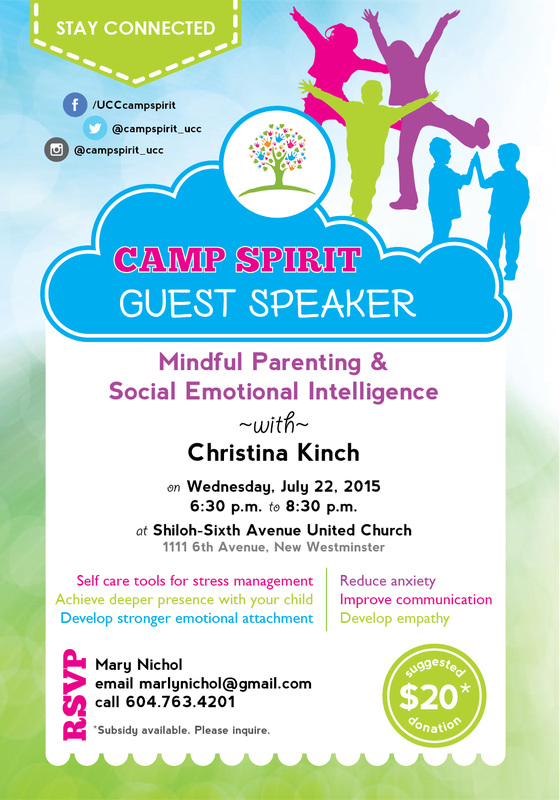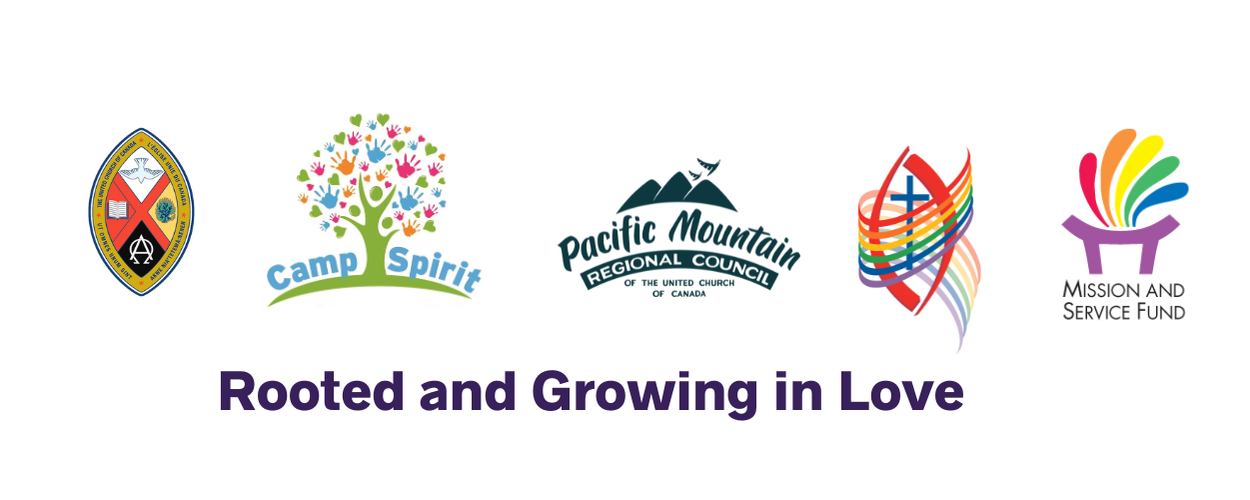|
Activities such as sports or dance exercise the body. Academics such as languages or math stimulate the mind. But what do we do to nurture the spirit? While sports and education may help to nurture the spirit of the child, it is not guaranteed. Much depends on the adults who offer leadership with the children in their care. Much also depends on each families' unique culture (not ethnicity or nationality but how the family communicates — family rituals; traditions and stories; systems of decision making; approaches to opportunities and problems; style of work; style of play; etc.). Research has shown that connecting your child with a faith community can contribute to his or her overall happiness. Nurturing the spirit, as well as the mind and body, of a child can contribute significantly to a child’s sense of well-being. In 2007, Mark Holder, Associate Professor of Psychology at UBC Okanagan, and graduate student Judi Wallace tested 315 children aged nine to 12, measuring spirituality and other factors such as temperament and social relations that can affect an individual’s sense of happiness. “Our goal was to see whether there’s a relation between spirituality and happiness,” Holder says. “We knew going in that there was such a relation in adults, so we took multiple measures of spirituality and happiness in children.” When we focus all our time, energy and resources on nurturing ONLY the body and the mind of a child we neglect essential elements in a child’s growth and development…
Cathy Cryder Minister with Children, Youth and Families Dunbar Heights United Church Music is so important to our lives. So many memories are connected to the music we listen to, sing with, and are moved by -- music marks and shapes our lives. I can still remember the songs I sang at camp, "This Little Light of Mine" and "It Only takes a Spark," to name only two. I can still see in my mind the camp I was at and the people in that circle when I learned and sung those songs. At Camp Spirit, music is an integral part of our program. And for many of the children the songs continue to be sung outside of camp and many parents have asked us to post the songs they learn. Many of the songs we sing at camp are by Linnea Good. Linnea Good is an award winning Musical Animator and singer-songwriter, and she has generously shared two of her songs for you to sing along to at home! Please check out her website at www.linneagood.com.
Summertime is a blessing. Time together with family and friends, a change of pace, sunshine, and play time in water and sun! However, with the sunshine can also come some uncomfortably hot summer days. Heat has an impact and children are particularly susceptible to the heat. Depending on how high temperatures climb, children (and all of us), if we are not careful, can experience heat related illness (heat stroke, sunburns, etc.). Here are 5 affordable ideas of beating the heat with children!
1. Stay Hydrated - One of the most important things we need to remember is that our bodies need to be hydrated in order to function properly. Make sure that you and your children have access to water at all times. Have water bottles filled with ice and water, water coolers at arm's reach at all times. And water can be fun and flavourful! Check out these easy recipes to make healthy and naturally flavoured water: http://greatist.com/health/flavored-water-healthy-recipe. 2. Make Frozen Treats with your children. Freeze and then enjoy: frozen grapes, watermelon, berries, bananas or make homemade popsicles. Check out these frozen delectable treats: http://www.superhealthykids.com/recipe-category/popsicles-and-frozen-treats/. 3. Limit Time Outside - As much as being outside is fun, be conscious of sun and heat exposure. Visit the library and sit in their air conditioned buildings and immerse your child in the adventure of the stories! Support your local artistic, cultural, historical or scientific institution by visiting a museum. (The Happy Show is currently exhibiting at the Museum of Vancouver.) At many museums children 4 and under get in for free and there are family rates. Inside, children will learn and enjoy while staying out of the sun! 4. Go for a Splash - Be it at the beach, at an indoor or outdoor pool, be it in the tub even! Bring your temperature down by taking a dip. Did you know that all the outdoor pools in Surrey are free? Click here to find a pool in Surrey near you. 5. Stay Still - It is hard to suggest with a child but when it is hot, exerting a lot of energy can be problematic. Young children in particular heat up more quickly than adults and are at greater risk of heat-induced illnesses. Promote more low-energy activities; bring out the board games, the books, imaginative play, and dare I say, watch a movie?? You could also bring out the creativity materials - make pictures to send to friends and family, maybe even think about and create some Christmas gifts. Pinterest is chock-a-block full of creative ideas! Jen Cunnings Minister with Children, Families & Elders St. Andrew's-Wesley United Church
Ask any parent and they’ll tell you one of the more difficult tasks of parenting is dealing with stressed, anxious and/or distracted children. Add on everyday stressors like a job or career, finances, extracurriculars, caring for aging parents, etc. and soon you’ll have a parent experiencing unhealthy levels of stress too. This mix of demanding lifestyle has led some parents to seek complementary or alternative strategies to medication for their children, as well as seeking self-care strategies to balance the demands of parenthood. Mindfulness practices can help both you and your child to:
What is Mindfulness? Mindfulness is bringing conscious, nonjudgmental attention to the present moment. Whether you are joyfully witnessing a first in your child’s life, or scrubbing ‘art’ off the living room walls, mindfulness can enhance joy and decrease suffering.
Why Practice Mindfulness? Over the last decade working with families, I have noticed that parents and children are experiencing greater levels of stress-related illness than ever before. Increased screen time, highly scheduled lives, and the desire to “get somewhere” are all contributing to this reality. Anxiety and (most) stress are a result of where we have been (and what we think about it) or where we are going (and what we think about that). Neither of them are rooted in the here and now. Mindfulness brings attention to the present moment, thus, decreasing stress and anxiety, rebalancing the nervous system, and creating more space for joy. 
Children are sponges and learn much from osmosis. When parents practice mindfulness, this has a relaxing affect on their children. A child’s nervous system is linked to their parents. When the parents are stressed, the child’s nervous system creates it own stress signals. When parents are relaxed, the child’s nervous system relaxes.
How do I begin? I would love to tell you that mindfulness takes no time or effort and you will see great results. However, that would be a lie. Mindfulness is not a miracle. Mindfulness, like anything that will change your life for the better in long-term ways, takes commitment. Not unreasonable, impossible, ‘there is no way to fit it into my life’ commitment, but commitment. Make the time If you have never practiced meditation or mindfulness before, I suggest beginning with an intention to practice 3-4 times per week for 5-10 minutes. (That could be just 15 minutes per week!) I suggest choosing a specific time of day. Morning often works for people (depending when your kids get up), or just before bed. Make the space Choose an area of your house to practice consistently. Choose a cushion, or perhaps set a table with a candle. Be intentional about setting the space as this place will hold the energy of your practice. You may choose a visible place where your children are able to observe your practice, or you may choose a quiet place away from busyness.
Do the Practice
This practice is informed by Eline Snel’s book Sitting Still like a Frog and also “The Welcoming Prayer” as taught by Cynthia Bourgeault in Centering Prayer and Inner Awakening. Get comfortable in your space. Tell your family what you are up to. Set a timer. Light a candle and take a few long, slow, deep breaths.
Good luck practicing! Remember that setting aside time to practice mindfulness is simply building the foundation for practicing in everyday life.

Christina Kinch, BA CYC, CYA-YT
Family Wellness Consultant, Yoga Therapist, Energy Healer Christina has over 10 years experience working with children, youth and families. She blends her expertise in child and youth mental health, addictions and family development counselling with her experience in yoga therapy, energy healing and mindfulness meditation to help support and restore health to whole families. Christina is the founder of Kinchara, a Vancouver-based business that offers programs to families and professionals that explore health from a holistic (mind, body, spirit) and community-based perspective. Christina also provides individual family sessions as part of the “Whole Family Journey” program. These sessions are customized to meet the needs of families struggling with anxiety, stress, behavioural challenges, ADHD and more. For more information about Kinchara and the services Christina offers, please visit christinakinch.com.
If you are interested in learning more about the above practice, how to integrate mindfulness into your daily life, and how to involve your child in mindfulness practices:
|
|
||||||||||||







 RSS Feed
RSS Feed

